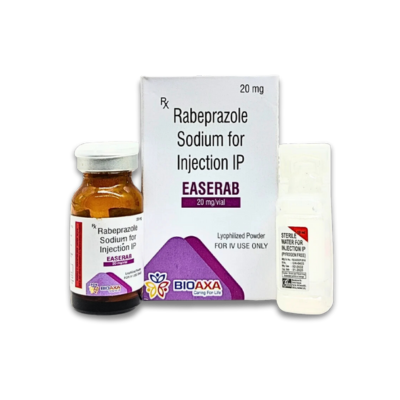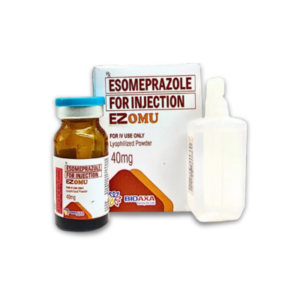Rabeprazole Sodium for Injection IP for Acid Reflux and Ulcer Relief
₹600.00
Easerab provides effective relief with Rabeprazole Sodium for Injection, containing 20 mg in a lyophilized powder form. Ideal for treating acid reflux, GERD, and stomach ulcers when oral medication isn’t an option, this product ensures quick results under medical supervision.
Easerab, manufactured by BIO AXA LTD, offers a reliable solution for managing acid-related conditions. This Rabeprazole Sodium for Injection contains 20 mg in a lyophilized powder form, designed for intravenous (IV) use. Specifically, it helps reduce stomach acid in patients with gastroesophageal reflux disease (GERD), stomach ulcers, or other acid-related disorders when oral treatment isn’t possible. Each pack includes the vial and sterile water for reconstitution, ensuring ease of use in clinical settings.

Who Can Benefit from Easerab?
Easerab effectively treats acid-related conditions in adults under the following scenarios:
- Patients with severe gastroesophageal reflux disease (GERD) who cannot take oral medications.
- Individuals with stomach or duodenal ulcers, especially those caused by H. pylori or NSAIDs.
- Those requiring short-term acid suppression during hospitalization, such as in critical care settings.
How to Use Easerab
Healthcare professionals administer Easerab intravenously after reconstituting the lyophilized powder with the provided sterile water. First, they dissolve the powder in 5 mL of sterile water for injection. Typically, doctors give 20 mg once daily as an IV injection or infusion over 15-30 minutes for up to 7 days. After administration, patients may transition to oral rabeprazole once they can swallow medications.
Key Features and Benefits
- Fast Acid Suppression: Easerab quickly reduces stomach acid, providing relief from GERD and ulcer symptoms.
- IV Administration: It works well for patients unable to take oral medications, ensuring effective treatment in critical situations.
- Complete Kit: Each pack includes the 20 mg vial and sterile water, making preparation simple for healthcare providers.
Storage Instructions
Store Easerab at 20°C to 25°C (68°F to 77°F). You can allow brief temperature changes between 15°C to 30°C (59°F to 86°F). However, never freeze the product to maintain its stability. After reconstitution, use the solution within 4 hours if stored at room temperature.
Important Safety Information
While Easerab is highly effective, it comes with some precautions:
- Kidney Risks: Long-term use of rabeprazole may affect kidney function. Therefore, doctors monitor patients closely during treatment.
- Side Effects: Some patients may experience mild side effects like headache, nausea, or diarrhea. Rarely, serious effects like allergic reactions or low magnesium levels may occur.
- Contraindications: Avoid using Easerab if you have a known allergy to rabeprazole or other proton pump inhibitors (PPIs), or if you are taking certain medications like rilpivirine.
Why Choose Easerab?
Easerab stands out as a trusted choice for managing acid-related conditions in critical care settings. Its IV formulation ensures rapid relief for patients who cannot take oral medications, making it a go-to option for healthcare providers. Moreover, the product’s clear packaging and inclusion of sterile water simplify preparation, helping professionals work efficiently in busy clinical environments.
For pharmacies and healthcare facilities, Easerab offers a dependable option to support patients with acid reflux or ulcers. Ensure proper administration by trained professionals to maximize safety and effectiveness.
Key Points
| Aspect | Details |
|---|---|
| Product | Easerab (Rabeprazole Sodium for Injection IP) |
| Strength | 20 mg (lyophilized powder) |
| Indication | Treats GERD, stomach ulcers, and acid-related conditions |
| Administration | Intravenous use by healthcare professionals |
| Dosage | 20 mg once daily via IV injection/infusion for up to 7 days |
| Warnings | Risk of kidney issues with long-term use; monitor patients during treatment |
| Common Side Effects | Headache, nausea, diarrhea |


Reviews
There are no reviews yet.